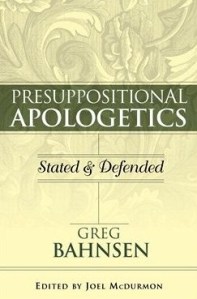Book Review: Presuppositional Apologetics: Stated and Defended


Presuppositional Apologetics: Stated and Defended, Greg L. Bahnsen (ed. Joel McDurmon), Powder Springs: American Vision Press, 2008. Hardcover, 296 pages, $34.95 USD.
It was early December 1995, the early years of the Internet. Along with many others, I was prayerfully following the developments in a hospital in southern California. A well-known Orthodox Presbyterian pastor by the name of Dr. Greg Bahnsen had heart surgery on December 5. Soon afterwards life-threatening complications set in. Colleagues sent out regular e-mails keeping everyone informed of what was happening. Then, on December 11, we received the news that Dr. Bahnsen had been promoted to glory. He was only forty-seven years old. In life, he had been a prodigious author of books and articles, scholarly and popular. However, it has only been since his death that we have seen the publication of his important works in the field of apologetics. The volume under review is described by the editor as being Bahnsen’s magnum opus, his greatest work.
The book has a curious story behind it. It seems that Bahnsen wrote this volume back in the 1970s and it somehow ended up being lost. After his death, as his office was being cleaned out, an envelope was discovered behind one of his filing cabinets. In that envelope was the manuscript for this book. Thus it happens that we receive a brand “new” book from Bahnsen long after his departure.
Presuppositional Apologetics has two parts. In the first, Bahnsen makes the positive case for Reformed presuppositional apologetics. After an initial overview, he develops the contours first of all from Scripture. The third chapter is more philosophically oriented, though Bahnsen would say that the argumentative considerations here are “functionally equivalent to the viewpoint of God’s Word or applications of its teachings that bear on knowledge, truth, etc.” (36). In the second part, Bahnsen critiques the apologetics of three other figures who have sometimes been described as presuppositionalists: Gordon H. Clark, Edward J. Carnell, and Francis Schaeffer. While finding some elements of genuine commonality with Reformed presuppositionalism, Bahnsen argues that these men fail to consistently build their apologetics on the solid ground of God’s Word. He summarizes his critique: “All three men fail to be presuppositional in their argumentative method, and the presuppositions they do utilize during the course of their defense are not biblical…They have two final authorities: reason and the Bible; of the two, reason plays the paramount role…Where Scripture is introduced at the beginning of an argument it is presented merely as a hypothesis to be verified” (268).
In my view, the two major strengths of this work are its detailed presentation of the Scriptural foundation for presuppositional apologetics and the extensive critique of Clark, Carnell and Schaeffer. However, the book also has some weaknesses. There seems to be an inordinate amount of repetition. It could have been more tightly written and I suspect that the older and more mature Bahnsen would have written it and edited it differently. Also, there are a number of obvious typos remaining in the text and other editorial infelicities. There is also the fact that this volume was written in the 1970s and so Bahnsen is interacting with figures who dominated apologetics in a previous generation. At a certain point, Bahnsen brings in Antony Flew’s refutation of Schaeffer (258-259). Of course, it would be unreasonable for us to expect Bahnsen to comment on this, but the editor might have noted Flew’s eventual abandonment of atheism and whether or not that changes the equation. Finally, some of the existing editorial notes are…well…odd. For instance, Bahnsen critiques Carnell for his “Christian hedonism,” noting that this is a “sorry phrase” (229). However, in a footnote, the editor then extols Bahnsen for being “way ahead of his time,” in coming up with this phrase before John Piper, although the editor admits that Piper was using it in a different (positive) sense (230).
Presuppositional Apologetics would be a good introduction to the subject for someone with some philosophical and theological training. It’s an intermediate- to advanced-level book on the subject. It could be used for a seminary course or an advanced Bible college course. Is it Bahnsen’s magnum opus? No, I’m not convinced that it is. I think that accolade still belongs to his monumental Van Til’s Apologetic: Readings & Analysis (P&R, 1998).



Thanks for the review!
[…] The next step up would be Bahnsen’s Presuppositional Apologetics: Stated and Defended. You can find my review of that one here. His magnum opus is without doubt Van Til’s Apologetic. VTA is a massive volume of […]